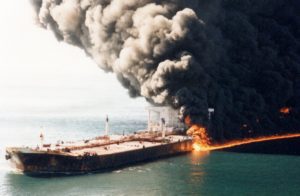HEED THEE SHAKESPEARE, COP 26
Having delivered lines of brave words, glowing promises and sweeping commitments to curtail climate change, the principal actors have left the stage of COP 26, the ‘last, best chance’ to save the world. Their resumés don’t bode well for the play’s climax, however. We the audience can only hope Shakespeare got it wrong when he wrote: “An overflow of good converts to bad.”
The deliberately dishevelled leading man, British Prime Minister Boris Johnson, was reviewed as having “claimed the role of the wealthy world’s chief climate warrior.” Only last year, however, Johnson asserted that there is no evidence the planet “is suffering from the extreme weather patterns associated with climate change”, and suggested we should be more worried about “a mini-ice age”.
President Joe Biden put the U.S. center stage. His career has been spent as the polar opposite to politicians like Bumptious Boris, but Biden’s climate change script is being re-written by Joe Manchin, Chairman of the Senate Energy and Natural Resources Committee, whose attitude toward initiatives like COP 26 is closer to no-shows Russia and China, and for good reasons. Last year alone Manchin, a Democrat, “received half a million dollars in dividends from Enersystems, a coal company he started in the late eighties, which is now run by his son. He is also the U.S. senator who’s received the most money in political donations from the oil, gas, and coal industries.”
GAS AND HOT AIR
The willingness of the supporting cast of fossil fuel extractors to curb methane emissions that are 80 percent more dangerous for global warming than CO2 is welcome. But they deserve neither credit nor sympathetic reviews.
It beggars the imagination that oil companies can build and deploy offshore oil rigs weighing as much as 200,000 tonnes (Berkut in the Russian Pacific) to extract oil from as deep as 2,450 meters (Perdido in the Gulf of Mexico), but couldn’t, or never bothered to develop the technology to stop methane leaking from pipes and wells, or put it to “green” use.
Their belated commitment is straight out of Macbeth: “a tale told by an idiot, full of sound and fury, / Signifying nothing.”
According to Jeffrey Berman, director of energy transition analysis at the Rapidan Energy Group: “There is a general sense that at least when it comes to the oil and gas sector, a lot of the technologies and tools are available, so it is possible to cost effectively reduce methane.”
As T.S. Eliot wrote in Murder in the Cathedral: “The last temptation is the greatest treason: To do the right deed for the wrong reason.”
THE DAMAGE DONE
A recent report estimates the world-wide economic cost of air pollution from fossil fuels at $2.9 trillion, 3.3 percent of the world’s GDP. In 2018 it was linked to 4.5 million deaths, 1.8 billion days of work absence, four million new cases of child asthma and two million preterm births.
Paying no heed to such evidence gives the fossil fuel industry something in common with Iranian Revolutionary Guards.

In 1987 we filmed burning oil tankers they attacked in the Persian Gulf, willfully oblivious to the fact that if they managed to blow one apart, the resultant oil spill could seriously damage if not ruin their own coastline as well as those of their enemies. But the Revolutionary Guards tearing about in makeshift gunboats at least had the excuse of fighting a war with zeal based in the 7th century.
The credo of the guardians of fossil fuel production has been based solely on profit. For decades, researchers working for automakers, oil companies and chemical giants said low levels of exposure to leaded gasoline would not harm the general public. That was disastrously false, and they knew it. Leaded gasoline has been linked to lower IQs and higher rates of violent crime. Exposure to lead causes heart disease, cancer, and other diseases.
NO CHOICE
The cues for “big oil” to come on stage with lines about curbing climate-altering emissions are both political and economic. In the past decade the cost of solar panels and wind turbines has plummeted faster than predicted, making them viable for mass use.
A mere six years ago, electric vehicles were an oddity in the U.S. Today, car makers are betting their future on them.
Cost-competitive clean energy alternatives and intensifying political pressure are pushing countries to start — albeit slowly — phasing out coal power.
The ‘Final COP 26 Plan’, or whatever they choose to call it — no doubt something far more grand and less apocalyptic-sounding — will be script-doctored by technocrats and diplomats. As such documents invariably are, it will be riddled with compromises, fudges, obfuscations and commitments unlikely to be met.
Those who sign the document into history would do well to heed the famous phrase from Shakespeare’s ‘The Tragedy of Julius Caesar’:
“Men at some time are masters of their fates.
The fault, dear Brutus, is not in our stars,
But in ourselves, that we are underlings.”
Comments are welcome. Just Click CONTACT
To receive alerts to future posts, Click SUBSCRIBE
5 thoughts on “HEED THEE SHAKESPEARE, COP 26”
this quotation back…
from benjamin franklin…
“well done is better than well said”…
enough promises and pledges…
some UN system of sanctions against
parties who fall short of promises, etc.
may be a first step…
otherwise it’s this line coming to fruition
“burn, baby, burn”
Don’t hold your breath on the idea of punishment for non-compliance, although I’m all for it.
Well said ..
Manchin annoys us
Such a refreshing take on an all-important but tedious topic — bravo!